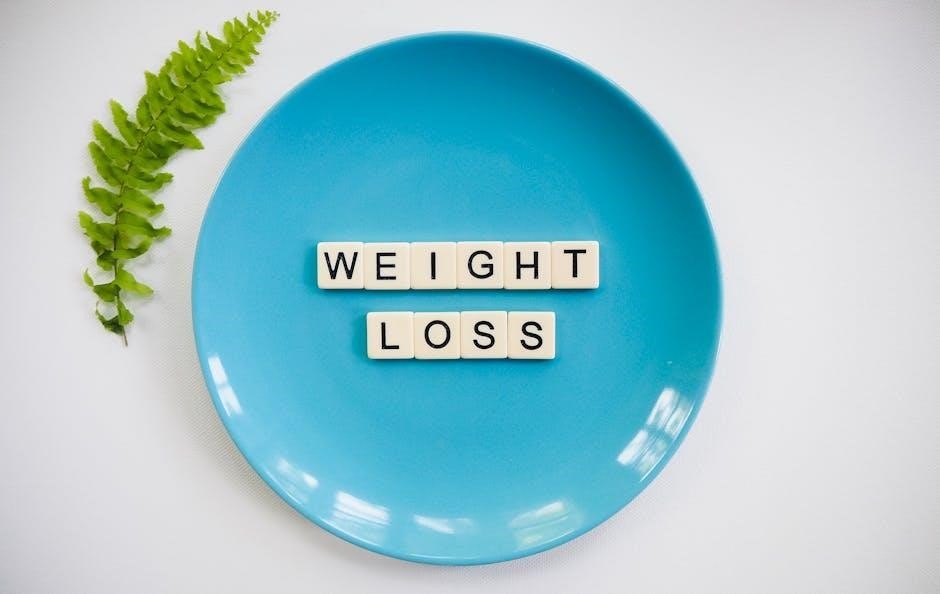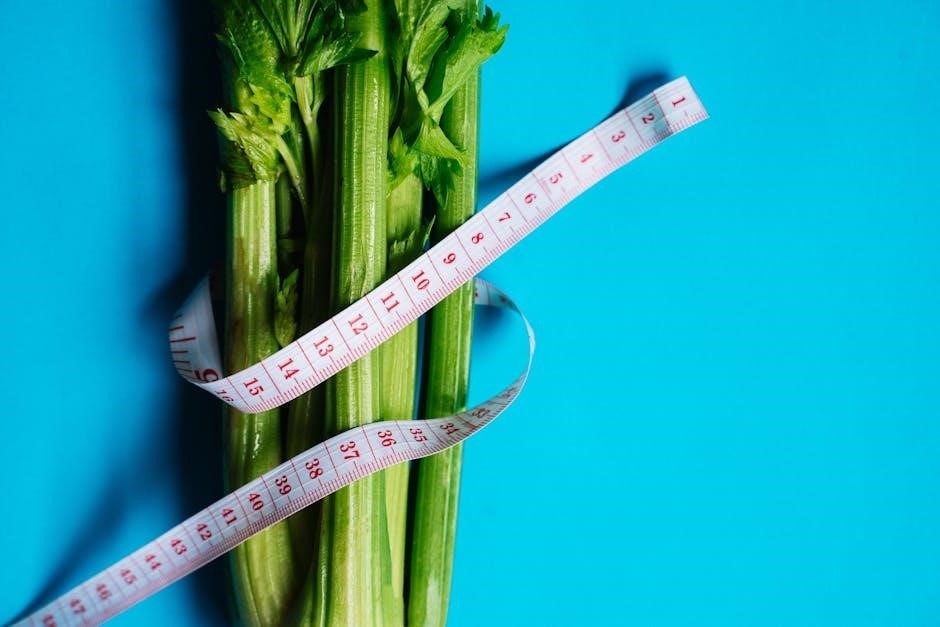Welcome to our comprehensive guide on the IVF diet plan! Discover how nutrition impacts fertility and explore a structured 14-day meal plan designed to optimize IVF success.
1.1 Why Diet Matters for IVF Success
Diet plays a crucial role in IVF success by optimizing fertility and overall reproductive health. A well-balanced diet rich in essential nutrients supports hormonal balance, improves egg and sperm quality, and enhances embryo development. Studies suggest that nutrient-rich foods, such as those in the Mediterranean diet, can significantly boost fertility outcomes. Eating a fertility-focused diet helps create a conducive environment for conception, increasing the chances of a successful IVF journey.
1.2 Overview of the IVF Diet Plan PDF
The IVF Diet Plan PDF is a comprehensive guide designed to support fertility and IVF success. It includes a 14-day structured meal plan with sample menus, recipes, and a shopping list. Focused on nutrient-rich foods like fruits, vegetables, whole grains, and lean proteins, this plan aims to optimize fertility and overall health. The PDF also highlights the Mediterranean diet’s benefits and provides practical tips for meal preparation and grocery shopping.

Key Components of an IVF Diet
A well-rounded IVF diet focuses on balanced macronutrients, whole foods, and fertility-boosting nutrients. It emphasizes fresh fruits, vegetables, lean proteins, and healthy fats to support reproductive health.
2.1 The Mediterranean Diet for Fertility
The Mediterranean diet is highly recommended for fertility due to its rich content of antioxidants, vitamins, and essential fatty acids. It emphasizes whole grains, fruits, vegetables, nuts, seeds, and healthy fats like olive oil. Studies show that women following this diet have higher IVF success rates. Incorporating seafood, legumes, and herbs further enhances its benefits, making it a cornerstone of fertility nutrition.
2.2 Importance of Nutrient-Rich Foods
Nutrient-rich foods play a vital role in supporting reproductive health and enhancing fertility. Fresh fruits, vegetables, whole grains, lean proteins, and healthy fats provide essential vitamins, minerals, and antioxidants. These nutrients help balance hormones, improve ovarian function, and support overall well-being. Incorporating foods like leafy greens, berries, and omega-3 rich sources ensures your body is optimally prepared for IVF, boosting both egg and sperm quality. A balanced diet is key to maximizing fertility potential.
The 14-Day Fertility Meal Plan
This structured 14-day plan offers a comprehensive approach to improving fertility through diet. It includes sample menus, recipes, and shopping lists focused on nutrient-rich foods to optimize conception chances.
3.1 Sample Menus and Recipes
The 14-day fertility meal plan includes diverse and nutritious recipes designed to boost fertility. Breakfast options like banana-walnut smoothies and whole-grain oatmeal provide essential vitamins and antioxidants. Lunches feature grilled chicken salads with mixed greens and quinoa bowls rich in protein and fiber. Dinners include baked salmon and vegetable stir-fries, emphasizing omega-3 fatty acids and minerals. Each recipe is tailored to support hormonal balance and reproductive health, making it easy to follow and delicious. Download the IVF diet plan PDF for full access to these fertility-enhancing meals.
3.2 Benefits of a Structured Meal Plan
A structured meal plan offers numerous benefits for IVF success. It ensures balanced nutrition, optimizing fertility by providing essential vitamins, minerals, and antioxidants. Meal planning simplifies grocery shopping and reduces decision fatigue, saving time and stress. It also promotes metabolic health, supports hormonal balance, and helps maintain a healthy weight. By following a tailored plan, you can avoid nutritional deficiencies and focus on fertility-boosting foods. Download the IVF diet plan PDF for a clear, organized approach to your fertility journey.

Fertility Superfoods
Discover the power of fertility superfoods to enhance your reproductive health. Incorporate nutrient-dense foods like berries, nuts, seeds, and leafy greens to support hormonal balance and improve fertility outcomes naturally.
4.1 Foods to Include for Optimal Fertility
Focus on whole, nutrient-dense foods to support fertility. Include leafy greens like spinach and kale, berries for antioxidants, and fermented foods for gut health. Opt for whole grains, lean proteins, and healthy fats like avocados and olive oil. Nuts and seeds, such as walnuts and pumpkin seeds, provide essential omega-3s. Incorporate seafood rich in selenium and zinc, and consider full-fat dairy for hormonal balance.
4.2 Avoiding Unhealthy Choices
Limit processed foods, sugary snacks, and refined carbohydrates, as they can disrupt hormonal balance. Avoid excessive red meat and opt for plant-based proteins instead. Reduce alcohol and caffeine intake, as they may hinder fertility; Steer clear of unhealthy fats, such as those found in fried foods, and choose natural, unprocessed alternatives. By avoiding these, you create a healthier environment for conception and IVF success.
Weekly Shopping List for Fertility
Stock up on fresh fruits, vegetables, whole grains, lean proteins, and healthy fats. Avoid processed foods and opt for organic, nutrient-dense choices to support fertility.
5.1 Essential Items to Buy
Focus on fresh, organic produce, including berries, leafy greens, and citrus fruits. Incorporate whole grains like quinoa, brown rice, and oats. Opt for lean proteins such as chicken, fish, and eggs. Nuts, seeds, and healthy oils like olive oil are crucial. Don’t forget herbs and spices for flavor. Avoid processed foods and sugary snacks; Choose full-fat dairy products and fermented foods for gut health. Check labels for minimal added sugars and artificial additives.
5.2 Tips for Grocery Shopping
Plan your meals and create a shopping list to avoid impulse buys. Prioritize fresh, organic produce, whole grains, and lean proteins. Choose healthy fats like olive oil and avocado. Incorporate nuts, seeds, and fermented foods for gut health. Read labels to avoid added sugars and artificial ingredients. Buy in bulk for cost savings and freshness. Shop seasonally for variety and nutrient-dense options. Always check expiration dates for optimal quality and safety.

The Acubalance Fertility Diet Basics
The Acubalance Fertility Diet emphasizes balanced macronutrients and abundance to support reproductive health. Focus on whole foods, ensuring carbs, fats, and proteins are present in harmony.
6.1 Balanced Macronutrients for Fertility
Balanced macronutrients are essential for fertility, ensuring the body has adequate energy and nutrients for reproductive health. Carbohydrates provide energy, proteins support hormone production, and fats aid in hormone regulation. Whole, unprocessed foods like whole grains, lean proteins, and healthy fats are key. Avoiding processed foods and focusing on nutrient-dense meals helps maintain this balance, supporting optimal fertility and overall well-being. Clinical evidence highlights the importance of this balance in improving IVF outcomes.
6.2 The Role of Abundance in Nutrition

The Acubalance Fertility Diet emphasizes the concept of abundance, ensuring the body has ample nutrients to support fertility. This approach focuses on providing balanced macronutrients—carbohydrates, proteins, and fats—to signal the body’s readiness for conception. Abundance means nourishing the body with whole, nutrient-rich foods, avoiding deficiencies, and promoting optimal hormone production. This mindset supports overall health and enhances fertility, making it a cornerstone of the IVF diet plan.
Creating a Personalized IVF Diet Plan
A personalized IVF diet plan involves assessing your nutritional needs and tailoring meals to optimize fertility. This approach ensures you receive the right balance of nutrients, vitamins, and minerals to support your reproductive health while considering personal preferences and lifestyle. Customization helps maximize the effectiveness of your IVF journey.
7.1 Assessing Your Nutritional Needs

Assessing your nutritional needs is the first step in creating a personalized IVF diet plan. This involves evaluating your current diet, health status, and lifestyle to identify deficiencies or areas for improvement. Factors such as age, weight, and medical conditions are considered to tailor recommendations. A healthcare provider or dietitian can help analyze your needs and ensure your plan aligns with fertility goals. Regular monitoring and adjustments are key to maintaining optimal nutrition.
7.2 Customizing the Meal Plan
Customizing your IVF diet plan ensures it fits your lifestyle, preferences, and health needs. Start by incorporating foods you enjoy while focusing on fertility-boosting ingredients. Adjust portion sizes based on activity levels and weight goals. Consider dietary restrictions, such as vegetarian or gluten-free options. Regularly review and adapt the plan to maintain variety and ensure it remains aligned with your fertility objectives. Meal prepping and scheduling can also enhance adherence.
Meal Prepping and Batch Cooking
Meal prepping and batch cooking save time, reduce stress, and ensure consistency with your IVF diet plan. Prepare nutrient-rich meals in advance to maintain fertility-boosting nutrition effortlessly.
8.1 Time-Saving Strategies
Meal prepping and batch cooking are essential for maintaining a consistent IVF diet plan. Plan meals for the week, shop for ingredients in bulk, and prepare portions in advance. Use leftovers creatively to minimize cooking time. Simple recipes like salads, soups, and stir-fries can be batch-cooked and refrigerated or frozen. Incorporate one-pot meals and slow cooker recipes for efficiency. A well-organized shopping list ensures you have everything needed, streamlining the process and saving valuable time.
8.2 Staying Consistent with the Plan
Consistency is key to maximizing the benefits of your IVF diet plan. Stick to your structured meal schedule and avoid deviations, as this ensures your body receives the necessary nutrients for optimal fertility. Track your progress daily and set reminders for meal times. Use the downloadable PDF as a guide to stay motivated and accountable. Commitment to the plan will help maintain balance and support your reproductive health effectively.

Clinical Evidence for IVF Diet Plans
Research highlights the impact of diet on IVF success, with studies showing improved outcomes through nutrient-rich and Mediterranean-style eating. Proper nutrition enhances fertility and pregnancy rates.
9.1 Studies on Diet and IVF Success
Research consistently supports the influence of diet on IVF outcomes. Studies show that a Mediterranean-style diet, rich in fruits, vegetables, and whole grains, improves egg and sperm quality. Incorporating leafy greens, seafood, and healthy fats, while avoiding processed foods, has been linked to higher IVF success rates. A Greek study highlighted that women following a Mediterranean diet had increased chances of pregnancy. These findings underscore the critical role of nutrition in fertility treatments.
9.2 The Role of Nutrition in Fertility Outcomes
Nutrition plays a pivotal role in fertility outcomes, impacting both egg and sperm quality. A diet rich in fruits, vegetables, and whole grains supports hormonal balance and reproductive health. Avoiding processed foods and alcohol can further enhance fertility. Studies indicate that proper nutrition not only improves IVF success rates but also contributes to better overall health, making it a cornerstone of fertility treatments.
A well-structured IVF diet plan can significantly enhance fertility and improve IVF outcomes. By focusing on nutrient-rich foods and avoiding unhealthy choices, you can optimize your chances of success.
10.1 Final Tips for Success
Consistency is key—stick to your meal plan and stay hydrated. Incorporate a variety of colorful, nutrient-rich foods to ensure balanced nutrition. Avoid excessive sugar and processed foods, as they can hinder fertility. Use the provided IVF diet plan PDF as a guide to stay on track. Meal prepping and batch cooking can save time and help maintain consistency. Remember, small dietary changes can make a big difference in your IVF journey.
10.2 Downloading Your IVF Diet Plan PDF
Your journey to IVF success begins with the right tools. Download the IVF Diet Plan PDF to access a comprehensive guide packed with meal plans, recipes, and shopping lists. This resource is designed to simplify your fertility journey, ensuring you stay on track with nutrient-rich foods. Click the link to get your free copy and start nourishing your body for optimal results. Let this guide be your roadmap to a healthier, fertility-focused lifestyle.
